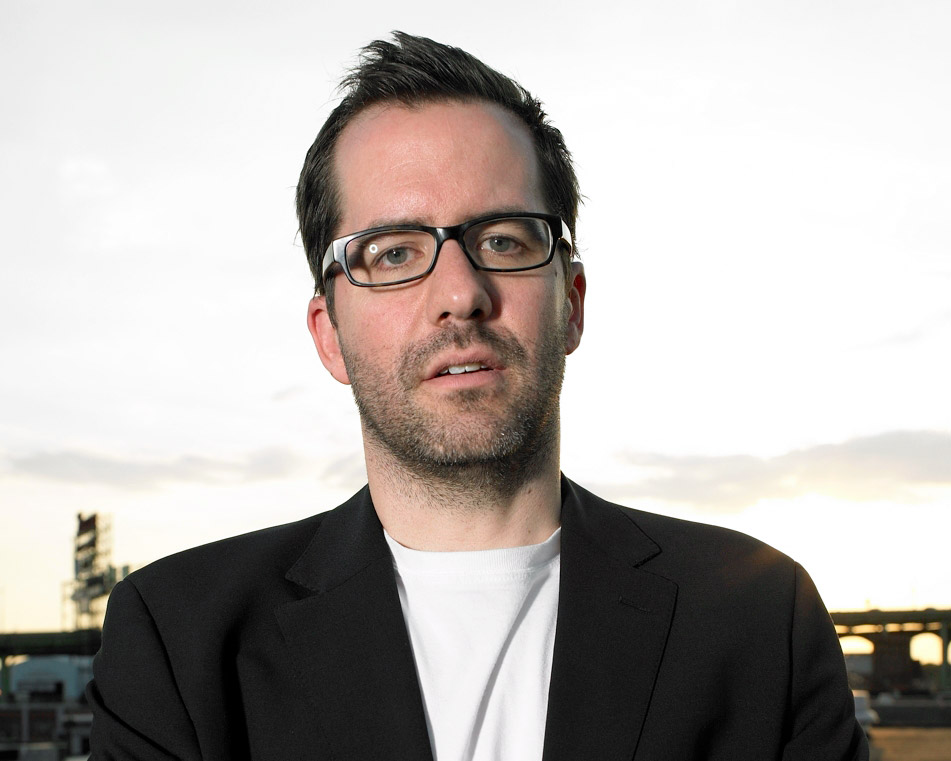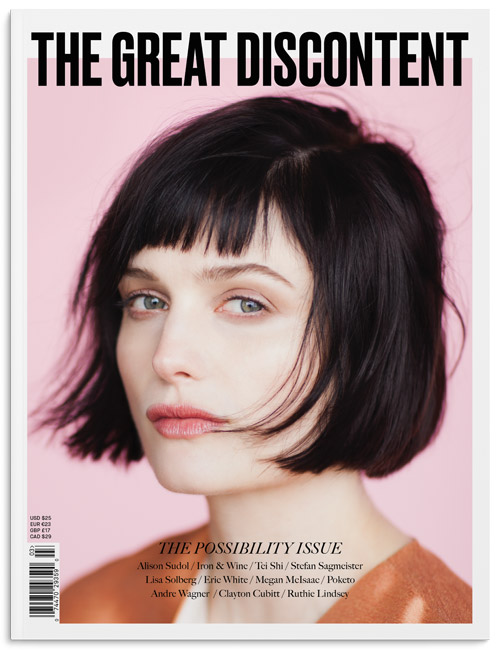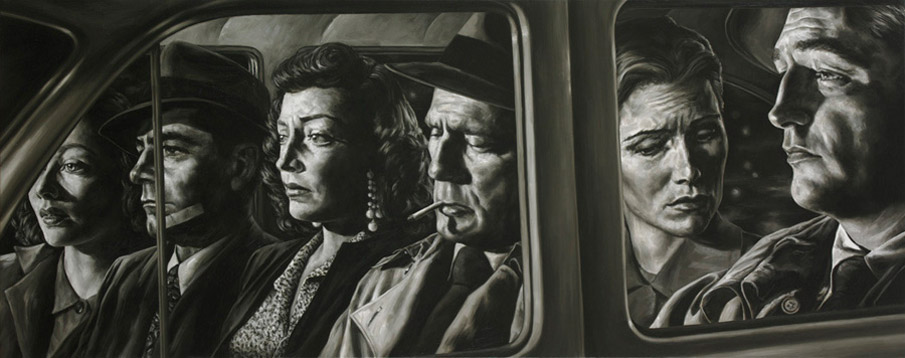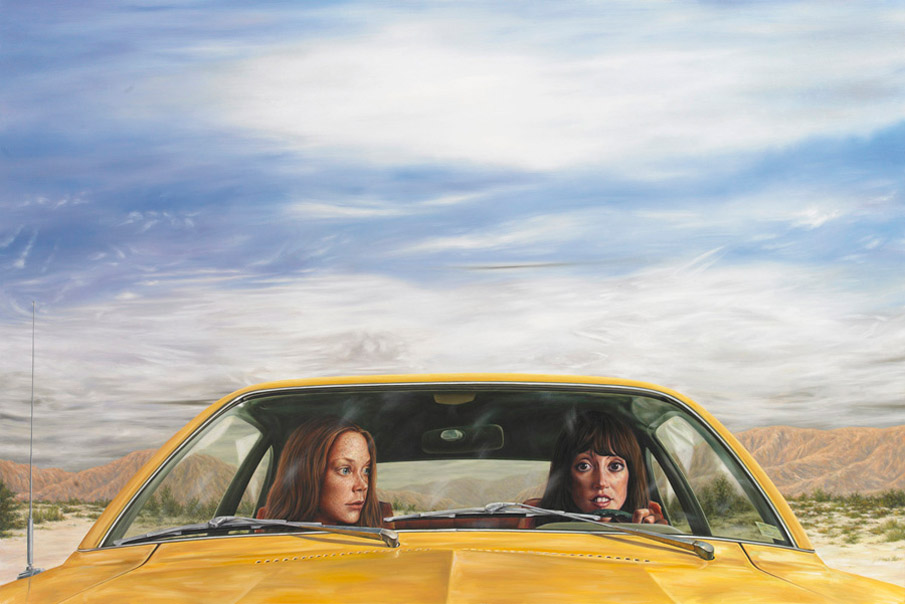
- Interview by Ryan & Tina Essmaker November 15, 2011
- Photo by Naomi Harris
Eric White
- artist
Eric White (b. Ann Arbor, MI, 1968) received his BFA from the Rhode Island School of Design in 1990. He has shown extensively in galleries and museums around the world. Relying heavily on the dream-state, metaphysics, and 1940’s era Hollywood for inspiration, White examines the boundaries of human perception in conceptually complex and expertly rendered oil paintings. He currently lives and works in New York City.
Interview
 Editor’s note: An updated version of this interview, including new images and work, is featured in print in The Great Discontent, Issue Three, available in our online shop.
Editor’s note: An updated version of this interview, including new images and work, is featured in print in The Great Discontent, Issue Three, available in our online shop.
Describe your path to becoming an artist.
As a kid, I was always making stuff, always drawing and painting. It came very naturally and was what I wanted to do. As I got older, I didn’t really think of it as a viable career option. I just did it. When I was in high school and it was time to decide, I didn’t really consider art at first.
The high school I went to in Ann Arbor had a pretty good art program, but it was still lacking for me. It was a massive high school (bigger than the college I attended) and I only had a few friends there. I had a teacher that accused me of tracing something when I didn’t. In senior year, I switched to Community High, which was known for its art, theater, and music programs.
Even before that, I had a private art instructor for years who actually sat my parents down and told them, “Look, he should pursue this if he wants to.” And I had another good friend who really encouraged me. I guess I knew I could draw better than most other people, but it was the encouragement of these two people that led me to pursue art. My parents wanted me to go get a regular degree somewhere and do art as a minor.
I went with my dad to the Rhode Island School of Design (RISD) campus during our college tour. We were looking mostly at liberal arts schools, but we walked into a RISD classroom and saw the easels and that was it. From that point forward, I knew that was what I wanted to do.
I went straight out of high school to RISD and had to decide what my major was going to be after the first year. I knew it was going to be either painting or illustration, but I had only a vague understanding of what the difference was. Someone had told me that if I studied painting, all I would do was teach, which I didn’t think I wanted to do, so I majored in illustration. Maybe it was the more conservative choice, but it made sense for me at the time, and I was able to study with some really talented people.
After college, I wanted to go to New York because all my friends from school were moving there. Instead, I moved with my girlfriend to San Francisco because she had gone to high school there and wanted to move back. We broke up about two months after getting there. I briefly considered moving back to Michigan, but I stayed in San Francisco and started to do commercial work. I did pretty well and established a name for myself. I got connected with places like Mondo 2000 (predecessor of Wired) who wasn’t able to pay much, but gave me a lot of creative freedom. I was able to get some work published and build a great portfolio.
I worked as a microwave chef at a comedy club and had a job at an art supply store, where I met some amazing lifelong friends. My final day job was working at an animation studio. I was starting to get so much freelance work that I didn’t have time for my day job.
I didn’t really intend to do caricature work, but I ended up doing quite a lot of it. I was doing work for great clients and getting paid well, but it just began to feel a little disposable. Even though I was very grateful to be drawing and painting all day, every day, I started to get bored with it. I had these other weird ideas in my head that weren’t getting expressed through commercial work.
I look at that period as my technical bootcamp because I really learned how to draw and paint. And because I was getting bored, I started to make my own work on the side and began showing it in Los Angeles. I came into the LA art scene at a really good time and was offered my first solo show in 1996. After that, my freelance work really began to suffer because my heart just wasn’t in it anymore and I was so excited about the personal work. I had all these clients and this reputation as an illustrator, but I would rush through my jobs so I could get back to painting. It took me about 10 years to fully transition out of illustration.

“My childhood was somewhat chaotic, so drawing was a way to escape into my own little zone. I think it’s that way for a lot of creative people. You can’t control the things around you, so you create this little world you can escape into and control.”
Was the first solo show you did an “aha” moment for you?
Absolutely. I was so naive at that point. I was paying attention to illustration, not the art scene, in San Francisco or LA. I didn’t understand how any of it worked. When I was offered that solo show, I didn’t see the bigger picture, which was probably good because I did whatever the hell I wanted and didn’t over think it. It was really liberating. The response was pretty good and I sold a couple paintings at the opening, including one to Gail Zappa. A couple weeks later, Leonardo DiCaprio bought two or three paintings. It was pretty incredible.
Did you or do you have a mentor and if so, how did they inspire you?
Before I went to school, it was my private art teacher, Kay Gould-Caskey. The other person I think of is Jordin Isip, who I went to RISD with. He’s not really a mentor in the traditional sense, and I don’t know if he’d consider me one, but we’ve supported each other since the very beginning. We’ve spoken to each other probably once a week since graduation.
Are your family and friends supportive of what you do?
My parents were always very encouraging. My mom saved everything I ever made. They weren’t thrilled about me getting just an art degree, but once I made the decision they were really supportive. I’m very grateful for the support of my parents because I think most kids naturally draw and create, but it gets beaten out of them, or it’s not supported and they get discouraged and quit.
How was creativity a part of your childhood?
I always wanted to make things, build models, and draw and paint. My dad’s father was a Sunday painter. He worked in the Dodge plant in Detroit his entire life. We’d go to their house occasionally and he’d be in his den painting landscapes. I have one here in the studio that he made in 1939. My dad was an architect, but only dabbled in it. My mom was a nurse and hypnotist.
I’ve been thinking about my early psychology and what leads one to do certain things. My parents got divorced when I was seven. I have this distinct memory of my parents fighting upstairs, I could hear their muffled yelling. I was downstairs, all the lights were off except for one, and I was drawing from Ed Emberley’s book of faces. I think about that and how it was sort of this refuge for me. My childhood was somewhat chaotic, so drawing was a way to escape into my own little zone. I think it’s that way for a lot of creative people. You can’t control the things around you, so you create this little world you can escape into and control.
Was there a point in your life when you decided you had to take a big risk to move forward?
A couple times. There were years I would have made a lot more money if I had continued doing commercial work. It was risky to jump into this other thing [painting], but I just knew it was right because it was so much more satisfying to make this work that felt like my own. With freelance work, I was a hired hand. I don’t regret any of it because I was really lucky to get paid to draw and paint all day.

“New York has a certain intensity that can be exhausting. But there’s something to the energy here that is motivating and I think my work has gotten better as a result.”
We didn’t know you did illustration in your prior life. We didn’t dig up that dirt on you. (chuckling)
Yeah, a lot of that stuff I wouldn’t show just because it was so completely different and doesn’t relate to what I’m doing now.
What would you say to another young artist starting out?
Don’t stop until you get to where you want to be and work your ass off. That’s it.
If you could go back and do one thing differently, would you?
Yeah, I would have gone to see a Frank Zappa show when I was in high school. My friend had a ticket for me, but I was too afraid to go.
Well, okay, sometimes I wonder what would’ve happened if I had studied painting instead of illustration. I don’t regret the path that I took because I learned to do what I do now by doing all that commercial work. I only had to work crap jobs for about a year. If I had tried to go straight into painting, I might have struggled.
I don’t regret the decision to move to San Francisco. If I had gone straight to New York, it might have overwhelmed me. SF was mellow and had a lot of culture and interesting people. Moving to New York when I did was much better. I’ve been here for 11 years now.
How does where you live impact your creativity?
One of the reasons I left California was that I was getting too stagnant and comfortable and knew I needed a kick in the ass. I almost moved to LA. The idea of moving to New York was much scarier and more difficult logistically, but I was young enough and thought I should take the risk. I had a really hard time for the first couple years. It wasn’t an easy transition. New York has a certain intensity that can be exhausting. But there’s something to the energy here that is motivating and I think my work has gotten better as a result.
Is it important to you to be part of a creative community and do you have that in NY?
I definitely have it here. I’ve been part of an artistic community since my senior year of high school when most of my friends were into art and music. Then I went to an art school and many of my friends from there are in NY. I’m in a group show tomorrow night that was curated by a friend and a bunch of my friends are in the show as well. I guess I take it for granted.
Being an artist in NY can be intimidating. At a certain point, I decided I needed to surround myself with others whose work I liked and who I liked as people.
Do you feel a responsibility to contribute to something bigger than yourself?
I do, but I mostly feel guilty because I don’t have the time. I’ve done a couple things, but I’d like to do more. I teach. I don’t know if that counts. I just met someone who was encouraging me to go to this elementary school in Red Hook and do an art project with them. I’d love to, but I’m so behind with all these commitments I’ve made to shows and commissions. My list is out of control. I’m definitely falling short in that department.

“It was risky to jump into this other thing [painting], but I just knew it was right because it was so much more satisfying to make this work that felt like my own.”
Are you satisfied creatively?
I think I am. I’m always critical of my own work. Figurative painting falls in and out of favor and it’s kind of looked down upon. I’ve had an insecurity about that. Lately I’ve been coming to terms with it and realizing that I’m satisfied working that way. I would do it anyway, even if I were just working for myself. I’m learning to let that stuff go and not be so critical of myself. I am really happy that I have this job. I have a great life and am so thankful for it. What could be better? I can’t really complain about anything.
Is there anything you see yourself doing differently or anything you’d like to be doing in 5 to 10 years?
The one thing I think about is film. I don’t know what that would look like or how I would get involved. There is an idea for a science fiction movie I want to make with my friends.
I’d like to make more money. New York is so expensive. After 11 years here, I wouldn’t mind having a way to get out of the city more frequently and breathe real air and be around trees. If I’m still making a living from painting a few years from now, and still challenging myself with my work, I think I’ll be happy.
What does a typical day look like for you?
Actually, I just stayed up for 36 hours finishing a painting. I’d like for my days to become a little more typical. I’m trying to be more effective and structured with my time these days. I have an assistant who works a day a week and that helps. I try to get to the studio as early as possible. I used to work through the night and sleep all day, but I hate doing that now.
I get as much time in at the studio as I can with short breaks here and there. I leave the studio between 10pm and midnight unless I’m on a deadline. Near the end of a project or show, everything goes crazy. I’d like to get beyond that. I’ve been working that way since school and have had a hard time breaking the habit. I delivered a sopping wet painting to a gallery yesterday, which I don’t enjoy doing. I’d love to finish things a few days before they’re due, but that rarely happens.
What do you do for fun?
I’m lucky because a lot of my job is fun. Going out to openings and hanging out with friends is fun as well as a job requirement. I don’t go too crazy much anymore. My life is pretty boring actually. My friends own Lit bar, so every once in a while I’ll go there and stay until daylight. I don’t do that as much as I used to because it generally ruins me for the next day. I have started DJing there, which is incredibly fun.
I’m also lucky that traveling is part of my job. After my recent show in Italy, I met up with my friend Joe Sorren. He and I did a show together in LA a couple days before 9/11. This time I had a show in Milan and he had one in Rome. We spent about 10 days together traveling and it was great to finally have a real vacation.
Current album on repeat?
Just one? There are too many. Wugazi – a Wu-Tang & Fugazi mash-up (I usually hate mash-ups, but this is really great). I love Grizzly Bear. The new Steven Malkmus is good. What else? I was on a big Jimmie Rogers kick for a bit. I also like Minutemen, Soft Machine, Micachu, The Fall, Kool Keith, Fela; there are so many more. I tend to get obsessed with things and I can’t listen to anything else but one song or album for a while. For some reason in Italy, all I could listen to were these two Steely Dan songs over and over again. I have music with me all the time. I put myself to sleep with music, I listen to it in the studio, at home, on the train, in my car. It’s crucial to me and has been since I was a kid.
Favorite movie?
Love Streams by John Cassavetes. You can’t get it in the States. It was released in France and I bought a copy of it last time I was in Paris. I can’t even play it because I don’t have an all-region player anymore, but I needed to own it. It used to be Star Wars, but he [George Lucas] ruined that for me. That was my favorite movie forever. I was shellshocked after I saw the first movie when I was 9 years old, but the new stuff is awful.
Tina: I grew up watching Star Wars. Have you seen Ewoks: The Battle for Endor? I thought the Ewoks were so cute when I was a little girl.
For me, that’s the moment the dark side took him [Lucas] over. (all laughing) In that third movie, the Ewok village was supposed to be the Wookiee planet. Making the decision to change that is the moment he went wrong. It was a downward spiral after that.
(Our Star Wars conversation digresses so we’ll spare you the details.)
Do you have any favorite books?
It’s really sad because I don’t read like I used to. I just don’t have time. The last book I read, which instantly became one of my all-time favorites, is East of Eden by John Steinbeck. The movie was coming to Film Forum in New York and I wanted to finish the book before seeing the movie. I didn’t, and I still haven’t seen the film, but the book is so incredible. I can’t think of another book that has come to life in the way this one did for me. It’s 600 pages long, but you don’t want it to end.
Ryan: The Road by Cormac McCarthy was like that for me. My brother recommended it and I couldn’t put it down.
Yes, that book is amazing! Every sentence feels so perfectly crafted. Another one of my favorites is White Noise by Don DeLillo. And right now I’m reading the instruction manual to the car I just bought. (laughing)
One of the last questions we ask is what is your favorite food, but Kyle Steed has suggested we ask, “If you were on death row, what would be your last meal?”
Well, if I could be on death row in Italy, it would probably be pretty simple: a caprese salad to start and some kind of pasta or salmon. The only food I can’t stand is eggplant. And chocolate is probably my favorite.
Tina: Milk or dark chocolate?
Dark chocolate.
Tina: I love dark chocolate too! (squealing with excitement)
Coffee is one of my favorite foods now too, which is funny because I only started drinking it a few years ago. I’m an espresso fiend.
Alright, one last question. What kind of legacy do you hope to leave?
(sighing) I don’t care…
Tina: Yes, you do.
I don’t think about it that much. It’s weird to think about that. I know I won’t care because I’ll be dead. I mean, I don’t know if I’ll ever have kids. If other people want to care about what I’ve done, that would be cool. It doesn’t matter what you do, some people are going to like it and some people are going to hate it.
What I do think about is that a lot of these [paintings] will outlive me, unless people throw them out. Art is basically a form of entertainment. If an object that I made can make someone happy after I’m dead, then I guess that’s a good thing.

